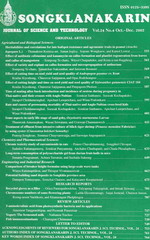ThaiScience
ThaiScience
SONGKLANAKARIN JOURNAL OF SCIENCE & TECHNOLOGY
Volume 42, No. 02, Month MARCH, Year 2020, Pages 299 - 304
Effect of lemongrass gel against candida albicans in rat model of oral candidiasis
Suwimol Taweechaisupapong, Thidarut Boonmars, Panitta Satthanakul, Visarut Chatchanayuenyong, Suwara Nitinon, Unthika Soodtoetong, Watcharapon Thipsongkroh, Watcharee Khunkitti
Abstract Download PDF
Candidiasis is the most prevalent fungal infection found in the oral cavity. Current interventions for oral fungal infections are not very successful and require a long treatment period. This research aims to study the in vitro and in vivo effects of lemongrass oil on Candida albicans. The antifungal activities of lemongrass oil towards C. albicans were determined by broth microdilution and time-kill assay. A lemongrass gel was formulated and its antifungal potential was evaluated in the rat model. The results from the in vitro study revealed that lemongrass oil possesses potent antifungal activity. In the in vivo study, 15 Sprague-Dawley rats were divided into 3 groups and treated with gel base, lemongrass gel, and Daktarin® gel. After 2 weeks, the quantity of C. albicans in the oral tissues of lemongrass gel- and Daktarin®-treated rats was significantly lower than the gel base group (P<0.05). The C. albicans colony-forming units of the lemongrass-treated rats was insignificantly different from the rats treated with Daktarin® gel. The data indicated that lemongrass and Daktarin® gel achieved comparable efficacy against C. albicans in a rat model which suggests the potential use of lemongrass gel for oral candidiasis.
Keywords
candidiasis, Candida albicans, lemongrass gel, rat modelSONGKLANAKARIN JOURNAL OF SCIENCE & TECHNOLOGY
Published by : Prince of Songkla University
Contributions welcome at : http://rdo.psu.ac.th
